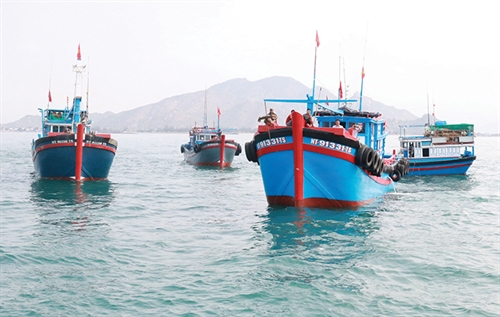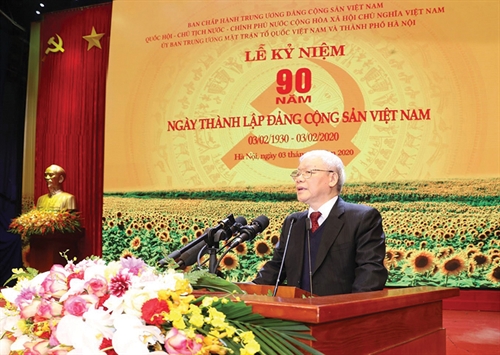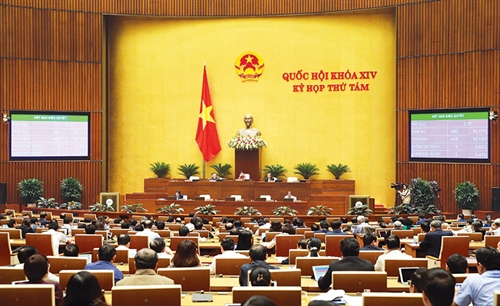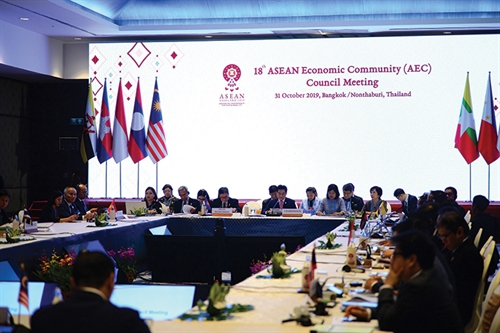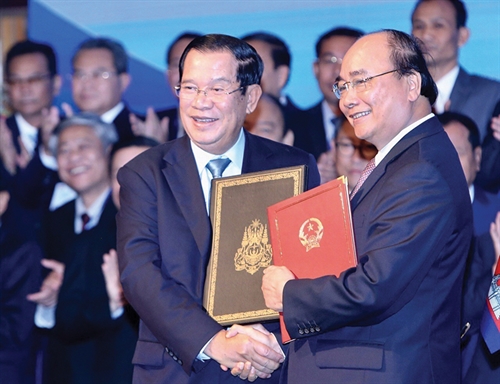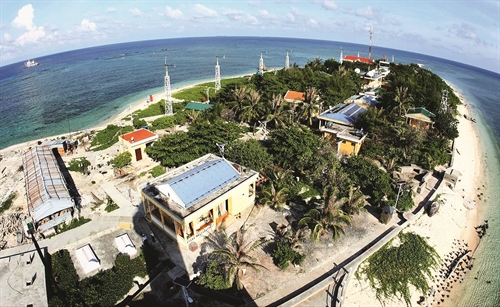Center for Community Support and Development Studies and United Nations Development Program
Background
The 2019 Vietnam Governance and Public Administration Performance Index (PAPI) Report,[1] released on April 28, 2020, reveals that even before Vietnam became affected by Covid-19, poverty, economic growth and the environment were top concerns of citizens in the country. The Report also highlights that the country made encouraging progress in governance and public administration performance to address citizens’ needs in the past year and delivers key insights into a broad spectrum of reform areas across nearly a decade. This stock taking helps inform decision-makers in 2020 - a pivotal year that will shape Vietnam’s future development agenda.
This article is an excerpt from the 2019 PAPI report and presents key findings from the 2019 PAPI citizen surveys. It focuses on three aspects that are relevant to what is being discussed on the policy agenda, especially at the wake of the SARS-CoV-2 (Covid-19) pandemic. First, it summarizes findings at the national level about issues of greatest concern for the Vietnamese citizens in 2019. Second, it shows the national trends in governance performance in critical areas of anti-corruption and e-governance. And finally, it presents key findings from the provincial level to inform stakeholders of provincial governance statuses. As the output of the 11th iteration of the citizen-centric surveys, the 2019 PAPI findings reveal the actual performance of local authorities in meeting the increasing needs and expectations of citizens throughout 2019.
Vietnam’s 2019 context was remarkable for the PAPI research. The year 2019 marks the fourth year of the 2016-21 government term - one year before the 2021-26 national elections. According to the General Statistics Office (GSO) (2020),[2] Vietnam’s Gross Domestic Product growth rate hit 7.02 percent - on par with 2018, while the Consumer Price Index in 2019 increased by 2.79 percent, the lowest rate in three years. Vietnam has made significant efforts in recent years to strengthen governance, reform public administration and fight corruption. Vietnam’s 2019 global Corruption Perception Index scores climbed by four points compared to 2018,[3] while quality of governance and public administration have demonstrated steady improvements over the past few years as reflected by PAPI and Provincial Competitiveness Index (PCI) reports.[4]
The year 2019 also witnessed important moves in Vietnam’s development agenda. The country is preparing for the 2021-30 Socio-Economic Development Strategy, in which environmental protection is an important pillar along with socio-economic development ones. In addition, the country has further opened its economy through signing the Vietnam-European Union Free Trade Agreement in June 2019. Such moves show Vietnam’s commitment to a better balance between economic growth, environmental protection and social development through enhanced transparency, government accountability and civic engagement.
Economic optimism and issues of greatest concern for Vietnamese citizens in 2019
The national context with positive vibes sent via different media channels in 2019 might lead to citizens’ optimism about their household economic situations. As the findings from household economic conditions show, many Vietnamese citizens found that their economic status was better in 2019 than before. As Figure 1 shows, the percentage of respondents reporting that their current household economic situation is good or very good continued to increase in 2019. However, within those numbers there was an important divergence between agricultural and non-agricultural respondents in 2019 (see 2019 PAPI Report, p. 23). Those respondents that work in the agricultural sector has less optimism with their household economic situations than those from non-agricultural sectors. This suggests that satisfaction with the economy in 2019 may not have extended equally to the agricultural sector in the second half of 2019.
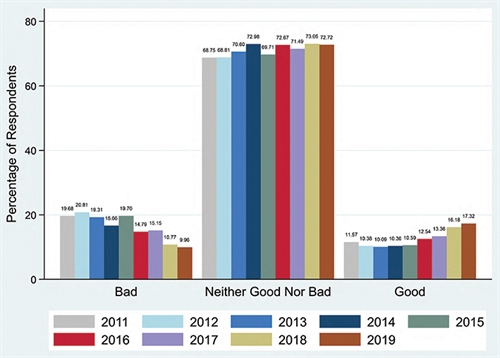 |
 |
Despite an overall economic improvement in Vietnam, economic concerns remain paramount in the minds of many citizens. In particular, poverty has dominated as an important issue. At the same time, other worries such as the environment and national security have emerged as important issues. As Figure 2 shows, poverty continues to be the most important concern in 2019 as it was in previous four years since 2015 (see Figure 3).
Additionally, the PAPI survey examined the issues of greatest concern, with poverty reduction topping the list. In exploring the causes, the findings reveal that a large factor driving poverty concerns was access to social insurance. The survey shows that while 18 percent of those with social insurance thought poverty reduction was important, the number surged to 27 percent for those without social insurance. It is possible that those less certain of access to financial resources after retirement were more concerned with the level and stability of income today.
In addition to poverty, the environment continues to be an important issue. While the number of respondents reporting the environment was a top concern declined slightly from its peak in 2016 after the fish kill crisis in central Vietnam, it has not returned to the previous low levels found in 2015 when the question was first asked. This suggests the environment continue to be salient in the minds of Vietnamese citizens, possibly as a result of poorer quality of air, water and government responsiveness to environmental pollution problems.
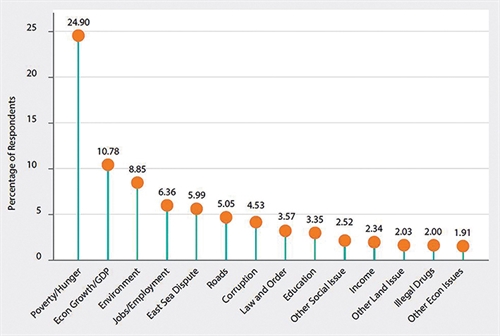 |
 |
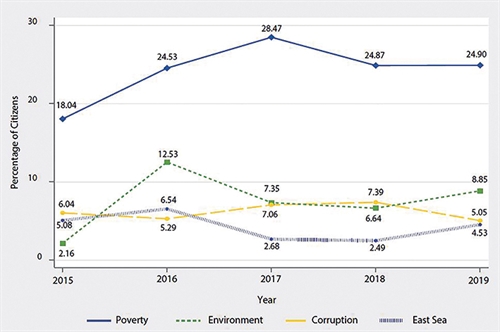 |
 |
Overview of governance and public administration performance at national level in 2019 and over time (2011-19)
The centerpiece of the PAPI survey is the governance index. The PAPI index is constructed to measure governance dimensions critical to citizen satisfaction and economic performance. Since 2011, the PAPI survey has tracked six key dimensions deemed important for these outcomes: (1) Participation at Local Levels, (2) Transparency in Local Decision-Making, (3) Vertical Accountability Toward Citizens, (4) Control of Corruption in the Public Sector, (5) Public Administrative Procedures, and (6) Public Service Delivery. Since 2018, PAPI has assessed two new dimensions - Environmental Governance and E-Governance - and used some new indicators to examine the pre-existing dimensions.
This section presents key findings around the first six core PAPI governance dimensions using unchanged indicators over time since 2011. As Figure 4a shows, five out of six core PAPI dimensions took positive steps forward in 2019 to continue an upward trend over the past five years. Only one dimension, Public Administrative Procedures, has remained relatively flat and even dipped in 2019. This is surprising as streamlining administrative procedures under Public Administration Reform (PAR) master plans has been among the remarkable reform efforts of the Vietnamese leadership since 1995.
Figure 4a also shows that the steepest upward trajectories have occurred in enhancing Control of Corruption in the Public Sector and increasing Transparency in Local Decision-making. These improvements also result from well-documented reform efforts, including the high-profile anti-corruption campaign and promulgation of implementing documents for Vietnam’s 2016 Law on Access to Information and 2018 Law on Anti-Corruption.
Figure 4b presents the average provincial scores on the PAPI score index of all 63 provinces since their inclusion in 2011. The graph clearly demonstrates that after a small downturn in 2015, the average province’s governance performance has demonstrated steady, incremental growth that has risen from 34.5 points in 2015 to 37.4 points in 2019, about a 10 percent growth rate in four years.
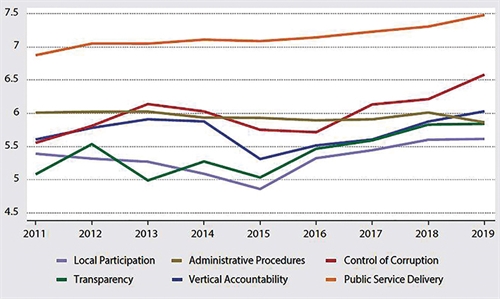 |
 |
The Control of Corruption in the Public Sector dimension delivered the strongest improvements in 2019. Figure 5 reveals broad improvements in all types of corruption measured, although indicating that equity in state employment remains falling far behind, raising concerns about quality and integrity of state employees.
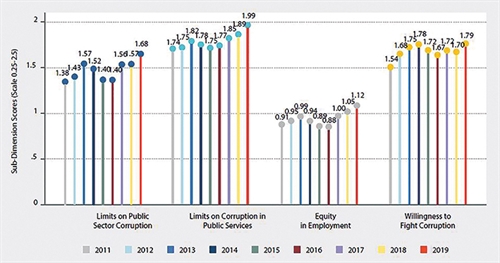 |
 |
Besides, there is continued evidence of actual declines in petty corruption experienced by citizens in specific areas. As the 2019 PAPI report reveals[5], the survey estimates that direct experiences of bribery have fallen to nearly zero percent at district-level public hospitals. Meanwhile, the percentage of applicants for land use rights certificates experiencing bribery for the paperwork done rose up again to 22.3 percent in 2019, after being reduced from 44 percent in 2015 to 15 percent in 2018. Furthermore, it is important to note that while Control of Corruption scores have improved, a substantial number of citizens (20 to 40 percent) continued to perceive corruption as problematic in the public sector.
The dimension that has not improved is Public Administrative Procedures. This is striking, given that from a business perspective, PCI scores indicate improved assessments of administrative procedure reforms. The PAPI survey results (see Figure 6)
in 2019 suggest that efforts to streamline procedures have been less impactful from citizens’ perspectives than businesses’. A deeper look within the PAPI findings reveals the lack of improvement may partly be due to the spotty rollout of e-governance reforms designed to streamline procedures for citizens. The survey shows a less than 1 percent increase in citizens using online local government portals for information on certification procedures in 2019 and a decline of 3 percent in citizens searching land titling procedures online through e-government portals. Thus, continued efforts to ensure uptake of online procedures may improve these scores in the future.
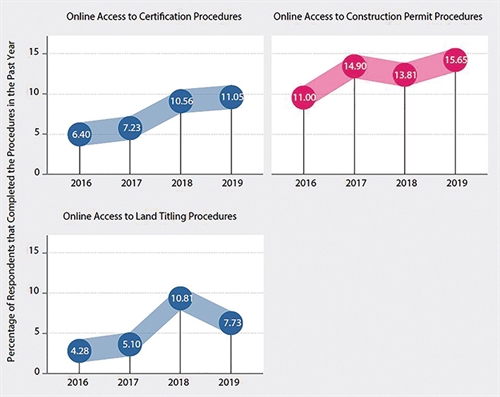 |
 |
2019 Provincial Performance
As results from the 2019 PAPI survey reveal, provincial governments need to better perform to keep pace with their citizens’ expectations. There was a significant disparity between the highest aggregated provincial score of 46.74 points and the potential maximum aggregated score of 80 points (on the scale of 10-80 points for all eight dimensions). This large gap suggests that opportunities exist for further reforms and better implementation of policy by local governments as they strive to be more open, transparent, accountable, responsive and act with integrity, especially in the final year of the 2016-20 government term.
Dimensional results also show that each province has its own strengths and weaknesses. None of the 63 provinces excelled in all eight dimensions. For instance, Ben Tre was in the best-performing groups in six out of eight dimensions. Still, it was in the poorest-performing group for the E-Governance dimension. Although Binh Dinh scored the lowest of all 63 provinces, it was in the high-average performing group in the Vertical Accountability Toward Citizens and Control of Corruption in the Public Sector dimensions. This suggests that no one-size-fits-all solution is best for all provinces. Local governments must review each indicator to understand where they have performed well and where they need to improve, and then identify relevant solutions for each policy area included in PAPI.
Year-on-year 2018-19 comparisons across the first six dimensions present important signals to each province (see Table 1). For instance, on Control of Corruption in the Public Sector, as many as 23 provinces improved significantly year-on-year and only four provinces saw significant drops of more than 5 percentage points. On Public Administrative Procedures, only one province (Tien Giang) improved with its dimensional score increasing by only 5.67 percentage points, and only two provinces (Khanh Hoa and Quang Ninh) fell significantly.
Furthermore, regional patterns have been consistent over time in some dimensions. More northern provinces did better in Participation at Local Levels and Transparency in Local Decision-Making, more central provinces excelled in the Vertical Accountability Toward Citizens dimension, while more southern provinces performed better in Control of Corruption in the Public Sector, Public Administrative Procedures, Public Service Delivery and Environmental Governance. Unlike previous years’ findings, in 2019 there was a more even regional distribution of better performers, which still scored below 4.5 points in the 1-10 point scale, in the E-Governance dimension. Regional differences may suggest areas of focus for government agencies in charge of regional development, such as encouraging provinces within each region to focus on weak areas and/or to exchange information or experiences with provinces in other regions.
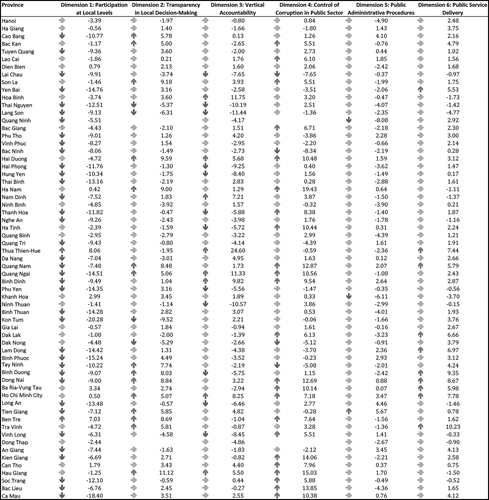 |
 |
Notes: Percentage of change in 2019 data from 2018 data, with a change of ±5% defined as statistically significant. Data for Dong Thap and Quang Ninh was not available in two dimensions in the 2018 PAPI report.
Conclusions
This article demonstrates that Government and Party policy reform efforts have led to improvements in most governance areas PAPI measured in 2019 after almost a decade with two government terms. Five out of the six core PAPI dimensions have shown continued progress since 2011 overall. The one area remaining stubbornly flat is Public Administrative Procedures. Provinces have made uneven efforts in improving their performance to keep pace with their citizens’ expectations. The significant disparity between the highest aggregated provincial score and the potential maximum aggregated score shows that provincial governments have a lot more to do to satisfy their citizens’ needs.
Additionally, improvements in 2019 governance outcomes were reflected in citizens’ overall satisfaction with 2019 household and national economic conditions. With that said, there are some indications that different sectors of the population have diverging views of changes in governance and economic satisfaction. Particularly with regard to concerns about poverty, evidence shows that those not tied to the formal sector and those working in agriculture may be more vulnerable than citizens in urban, formal sectors. It is projected that citizens’ worries about poverty may increase in 2020 because of the Covid-19 pandemic, which has affected both informal and formal sectors, especially when Vietnam further gets integrated into the world economy.
Apart from continued concern about the country’s economic growth, environment protection reemerged as the third issue of largest citizen priority for 2019. These findings reveal a complex dynamic for the government moving forward. On the one hand, Vietnam is changing with many citizens demanding attention to a different range of issues than in the past. Importantly, the environment continues to be among the top five issues of greatest concern in the minds of many Vietnamese, suggesting change of public policy priorities. On the other hand, many Vietnamese citizens still expressed concern about poverty, proposing the Government not to ignore economic development, opportunity and redistribution. In short, citizens increasingly demand both economic opportunities and environmental protection.-

